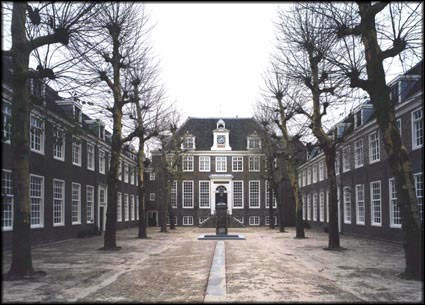The biannual conference of the International Society for Third Sector Research will gather researchers from all over the world. Our team at The Center for Philanthropic Studies at Vrije Universiteit Amsterdam is delighted to welcome you all to our campus and introduce you to the Dutch society of third sector practitioners and academics. For us, it will be a great opportunity to showcase the relevance of research in this field, contributing to the rise of modern philanthropy at the societal, political and policy agenda’s in the Netherlands.

Philanthropy in the Netherlands blossomed during the Dutch Golden Age (17th century) when many initiatives were undertaken for the socially disadvantaged. The picture above is the ‘Platanenhof’ a neighbourhood built for the elderly in the Jordan district of Amsterdam.
The civil society sector in the Netherlands has be receiving growing attention in recent decades, but can it still cannot be considered a mature sector. Philanthropy and the civil society are an unquestionable part of Dutch history, but because as it has been largely neglected for years, and has also insisted on its freedom to operate independently, civil society organizations haven’t focused on developing their own coherent sector. The quality of organization in the CSO sector is still in its early adolescence. What stages do organizations have to go through to be able to present a coherent and collective front? The sector needs a mission and a vision.
The sector has to be integrated into our welfare state model – a very difficult step to take. The philanthropy sector is barely organised, which makes it very hard to present a collective front to the authorities. Official bodies have a difficult time working out who they should deal with and who they should consult.
Also, the philanthropy sector, and CSOs more broadly, have to professionalize in order to become a mature sector. To do this, the sector urgently needs help from the scientific community, because scientific research and teaching are ‘conditio sine qua non’ to gain prestige.
More serious is the fact that many policymakers know little about what CSOs and philanthropic organizations actually do. In addition to this knowledge gap, government agencies and policymakers are often very hesitant about making contact with philanthropic organizations and reaching agreements with them. This attitude can be explained partly by the prejudice that still exists with regard to ‘philanthropy’. Wasn’t the welfare state created precisely in order to put an end to charity and philanthropy? Didn’t the welfare state mean the defeat of patronizing attitudes, paternalism and dependence?
These questions are being addressed by scholars, not only in the Netherlands, but all around the world. The ISTR conference offers us the opportunity to reflect on lessons learned in other country contexts and strengthen our own work at home.
Democracy and Legitimacy: The Role of the Third Sector in a Globalizing World is the 2018 theme of the ISTR conference. With the aim of addressing the potential and existing shortcomings of the organizations we study, the Amsterdam conference of ISTRs will offer suggestions for a way forward for sure.
See you in Amsterdam!
On behalf of the hosting committee,

Theo Schuyt
Professor Philanthropic Studies
Center for Philanthropic Studies
Vrije Universiteit Amsterdam

Pingback: CfA: 13th International Conference on Third-Sector Research – 10-13 July, Amsterdam (Deadline: 15.02.2018)
I will like to participate in this all important conference of philanthropic organisations and people working in the third sector.
LikeLike